early years and health, is being rolled out this month. Charlotte
Goddard provides an overview of what practitioners need to know.

The Early Years Foundation Stage (EYFS) progress check, usually carried out by a child's key person, is a statutory requirement for nurseries and childminders delivering childcare to two-year-olds within the EYFS framework. The health and development review, at age two to two-and-a-half, is part of the Healthy Child Programme, and is delivered by health visitors. The integrated review will bring these two assessments together, although how that is done will vary depending on the local authority.
Children not in early years settings will only receive the health element of the review, not the progress check, although the Government plans to explore ways that the full review might be offered to children not in formal early years settings at two.
WHY IS THE NEW REVIEW BEING INTRODUCED?
There have been concerns that a lack of integration between the two reviews means that some parents receive confusing and conflicting advice about their children, and that problems are not identified as early as they could be. 'Health visitors and early years practitioners can end up giving such mixed messages,' says Kay Mathieson, early years consultant and trainer. 'Different approaches and language can lead to misunderstandings.'
The integrated review should:
- offer a more complete picture of the child by sharing the expertise of the health visitor, early years practitioner and the child's parents
- lead to more appropriate intervention and support for children and their families, especially those for whom progress is less than expected
- eliminate duplication and offer a more straightforward approach for parents
- allow the Government to gather consistent national health data on the progress of children, through the Ages & Stages Questionnaire Version 3 (ASQ-3), which also acts as a starting point for discussion with parents.
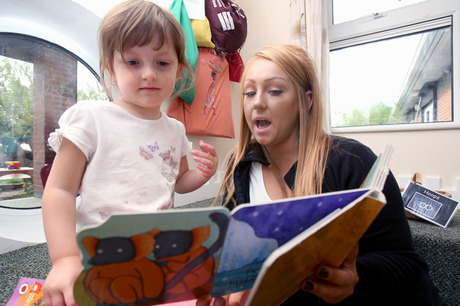
WHEN WILL IT START?
Local authorities across the country are 'expected' to begin rolling the integrated review out from this September, although implementation is not statutory, and the Government is not tracking how many are taking it up or how far along they are in rolling it out.
'We know from the pilot phase that it can take time to implement integrated reviews across the wide range of early years settings,' says a Department of Health spokesperson. 'Local authorities may wish to take an iterative approach to roll-out to manage risk: testing an approach in some areas, or one type of setting, before wider roll-out.'
Sue Robb, national head of early years at 4Children, which is supporting work on the integrated review implementation, says, 'I would be surprised if many are launching the full integrated review in September.' But she adds that the fact that local authorities are to take over commissioning health provision for under-fives from October, including health visitors, and the duty to gather the ASQ-3 data may drive implementation.
Some local authorities are at a more advanced stage with the roll-out. Six areas, for example - Norfolk, Northamptonshire, Medway, Leeds, Doncaster and Islington - started to pilot the integrated review in 2013, and five additional local authorities - Wigan, Warwickshire, Rotherham, Hackney and Bristol - had already started to develop an integrated approach and were labelled 'pilot partner' sites.
WHAT WILL THE REVIEW LOOK LIKE?

The review will look different in different areas, depending on geography, the needs of the population and the workforce mix. However, the integrated review must:
- be undertaken by professionals with the right skills, who have had appropriate training
- be implemented by local health and education systems in equal partnership, with appropriate information sharing processes
- have clear governance and accountability structures
- retain the existing elements of the two reviews it is replacing
- include the use of the ASQ-3, which will provide national data on children's health as well as feeding into an individual child's review.
The review will cover five areas:
- Personal, Social and Emotional Development
- Communication and Language
- Learning and Cognitive Development
- Physical Development and Self Care
- Physical Health
The process could involve early years and health staff coming toget- her to deliver the review in one meeting with the parent and child, as is the case in the London Borough of Hackney.
Another approach is to carry out the health and early years elements of the review in separate meetings, with the integration element arising from the sharing of information, and the development of integrated responses to identified issues.
One pilot area tried an approach where early years staff delivered the whole review, then shared the information with the health team, but this did not work effectively in practice as early years staff were not always able to make accurate judgements on the health elements of the process.
'Fewer local authorities are looking at the model where there is one meeting involving parents, health visitors and early years, with more looking at the model where the health visitors do their review, early years do theirs, and they come together with the parents to discuss the findings,' explains Ms Robb.
Ms Mathieson adds, 'I wouldn't be surprised if in many areas there is a graduated approach. For example, where the early years practitioners and the health visitors say, "Here's a family with a child with special educational needs; let's sit together and have this meeting", and with another family they might say, "We can do this just by sharing information".'
The findings of the review will be recorded in the child's 'red book', as well as in other formats, depending on the local authority. The findings should be written in a way that makes them easy to understand, and will identify areas where a child is progressing at a slower pace than expec- ted, and set out what will be done to support the child's development. Parents will take part in a discussion about who else might need a copy of the findings, and asked to give their consent to sharing the information. Early years providers should use the review findings to inform planning for the child's ongoing learning and development.
Doncaster has been running a small-scale pilot of the integrated review across private, voluntary and independent settings for the past two years, and is getting ready to roll out its new system. 'We have established a process that is more about information sharing than a one-stop shop,' says Janice Hollinghurst, early years education officer at the local authority. 'Trying to get everyone in one place at the same time was going to prove too difficult to manage.' Doncaster's health visitors will share information from the ASQ-3 with early years providers, and this will be used to feed into planning. Teams of health visitors will be assigned to specific groups of early years providers.
Much of what early years practitioners will bring to the integrated review will be the same as what is required for the early years progress check, but they can now also give their insight into family practices on health and well-being. Although they will largely rely on health staff to provide that element, early years practitioners will still have valuable insights on health and well-being made through observation of the child and conversations with parents.
WILL MY SETTING HAVE TO DO THE INTEGRATED REVIEW?
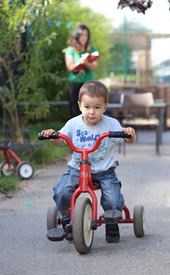 Delivery of an integrated review should be consistent across a local authority area, so all settings, including childminders, should be involved when the review is fully rolled out. However, in the roll-out period many councils will be piloting it in different areas, so your setting might not be involved initially. And since the roll-out is not statutory, it is possible that your local authority will not adopt the integrated review - though most probably will in some form.
Delivery of an integrated review should be consistent across a local authority area, so all settings, including childminders, should be involved when the review is fully rolled out. However, in the roll-out period many councils will be piloting it in different areas, so your setting might not be involved initially. And since the roll-out is not statutory, it is possible that your local authority will not adopt the integrated review - though most probably will in some form.
While childminders should be involved in the integrated review, local authorities will need to overcome a number of barriers. Doncaster's Ms Hollinghurst has been training childminders alongside other providers.
'Childminders agreed they could potentially hold a meeting at their home to which health could come, but from the point of view of health visitors there are so many childminders it might not be possible,' she says. 'Childminders felt that most parents would complete the ASQ-3 at home, so at the moment the suggestion is that childminders can prompt parents who have not completed the questionnaire to request the information again from health visitors.'
Childminders say another concern is that health visitors are reluctant to see them as professionals, and will not share data, so Ms Hollinghurst plans to offer further training for early years providers and health teams together, to help break down some of the barriers.
WHAT ARE THE MAIN CHALLENGES TO IMPLEMENTATION?
'The key issues will be about what is logistically possible and how much it costs,' says Ms Mathieson. 'There could be a significant financial and time pressure on settings, but I can't see a local authority will go down the line of every single child getting a full-blown meeting unless they can show that will save them money in the long term.'
The delivery of the review depends on the existence of teams of health visitors, so another challenge is the recruitment and retention of staff. The latest figures show 12,077 full-time equivalent health visitors employed in England in March 2015, meaning the Government only narrowly missed meeting the target of recruiting 4,200 extra health visitors by 2015. But recruitment has been patchy, and some places have more health visitors than others.
'In some areas practitioners already carry out checks with the local health visitor team, they put information in the back of the red book and health visitors know to look for it,' says Ms Mathieson. 'But in other areas that is not the case.'
Cultural differences between the health and early years sector are also a barrier, with different approaches and jargon - or sometimes different understanding of the same word, such as 'assessment'. Also, a child will often have only one early years key person but a team of health visitors, making information sharing difficult.
HOW CAN I BEST PREPARE FOR THE REVIEW?
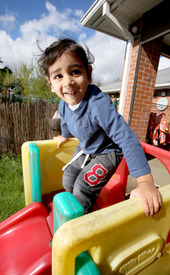 If you haven't already, brush up on the Local Offer - the information on what children's education, health and social care services are available - and make sure all staff are aware of it.
If you haven't already, brush up on the Local Offer - the information on what children's education, health and social care services are available - and make sure all staff are aware of it.
'I feel strongly that all of our practitioners must know the Local Offer exists and have a sense of what is included in it,' says Ms Mathieson. 'If you are going into an integrated review meeting and agreeing that a child's speech and language is not moving forward as we would like, and everything is being done in the setting and at home that can be, then professionals need to know what exists in order to make suggestions for further action.'
Settings should also be confident that their progress checks are well-managed - particularly when it comes to involving parents - and child-centred, and start thinking about their relationship with local health visitors, says 4Children's Ms Robb. 'Start speaking to health visitors and try to find out what they are doing about their bit of the interview,' she suggests.
The National Day Nurseries Association (NDNA) is currently developing a fact sheet for its members, and a half-day course, which will launch in September. Stella Ziolkowski, NDNA director of quality and workforce development, says, 'We've already held webinars for our special educational needs and disability champions, who co-ordinate care and education for special needs children in nurseries.
'Practitioners should now be making sure their information-sharing systems and processes are in place and establishing where their own role sits within wider support serv- ices. This is a real cultural change for joint working and for the child and their families being at the core of the review.'
The National Children's Bureau (NCB) suggests different assessment tools in its supporting materials for practitioners (see 'More information' column).
WILL WE NEED EXTRA TRAINING?
Again, it will depend to some extent on the model adopted by a setting's local authority, but joint training with health and early years together can break down some of the cultural and language barriers between the sectors. 'Local authorities are beginning to do joint training about the integrated review with health visitors and practitioners, which should include all EYFS practitioners,' says Ms Mathieson. 'It is important to understand what the other person will take from what the information you are giving, whether that is a parent or a health visitor. Health visitors and early years practitioners need to feel they are on the same side, talking together and respecting each other.' Doncaster, for example, is planning training for early years providers on the ASQ-3, and how it fits with the early years outcomes.
The most common approach to practitioner training in the pilot authorities was briefing days, mainly focused on the new processes and forms required. However, feedback indicated that this was insufficient - some practitioners needed more training on child development, making clinical judgements, and, in particular, communicating with parents. The pilot study also found that there is a benefit from involving practitioners who know the child well, even if they are less experienced in child development than other colleagues, so long as there is sufficient expertise in child development in others who are inputting into the review.
HOW SHOULD WE PRESENT THE REVIEW TO PARENTS?
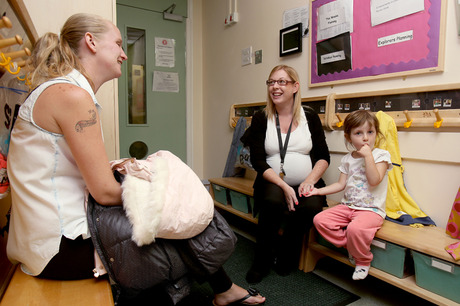
The NCB recommends that a starting point for all reviews should be an acknowledgement that parents know their own children best. 'As they draw together what they know about children's development, practitioners should take the opportunity to fully involve parents and children in the process,' says Susan Soar, senior development officer for the Early Childhood Unit at the NCB. 'Parents' opinions, experiences and insights are a fundamental part of the review, and can help ensure that a rounded picture of a child's development and needs emerges. If we get this right then children can really benefit from the new joined-up approach.'
Feedback from the pilot studies revealed that parents were more engaged with the review process when all practitioners that families came into contact with took every opportunity to engage them face to face. Communication materials should be designed in consultation with parents and incorporate clear messages about the benefits of reviews, and reassurance about likely concerns.
The review itself should be pitched as an 'entitlement' so that it is seen as a positive opportunity for parents to discuss how their child is developing and what is going well, as well as any worries they might have.
Look out for Part 1 of our new series on the integrated review by Kay Mathieson in the 5-18 October issue.
MORE INFORMATION
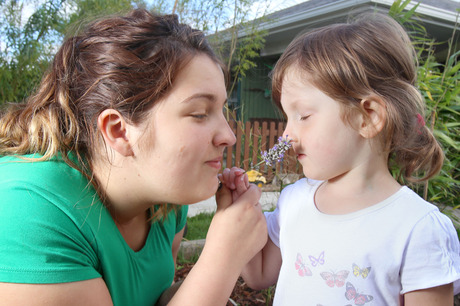
Integrated Review at Two: a toolkit for local authorities, NCB. Resources supporting local early years and health teams to design and implement the Integrated Review www.ncb.org.uk/what-we-do/research/our-research/a-z-research-projects/integrated-review-at-2-a-toolkit-for-local-authorities
Implementation Study: integrated review at two - two-and-a-half years, Department for Education, www.gov.uk/government/publications/integrated-review-at-age-2-implementation-study
The Integrated Review: bringing together health and early education reviews at age two to two-and-a-half, a guide for early years practitioners, NCB, www.ncb.org.uk/media/120116/ncb_integrated_review_supporting_materials_for_practitioners_march_2015.pdf.









